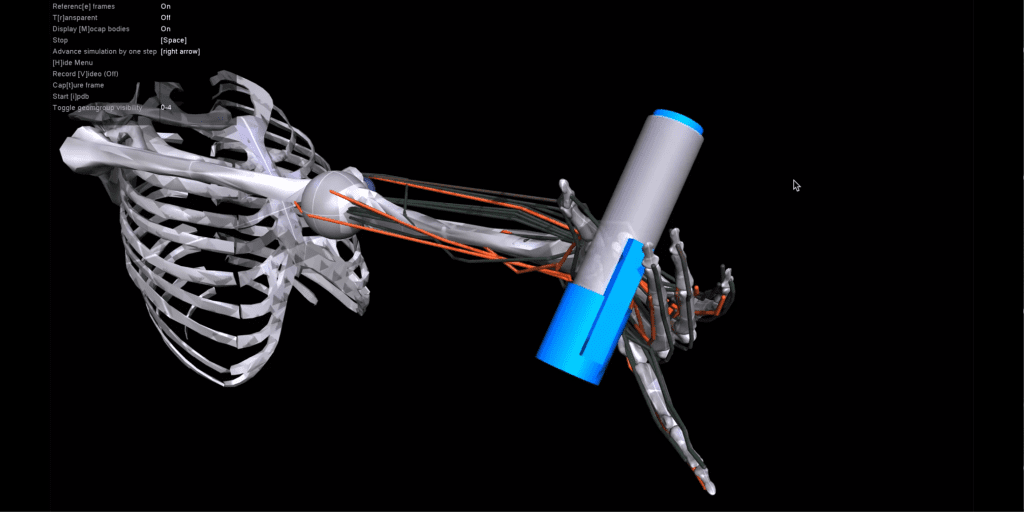On May 23, Mark Zuckerberg announced that researchers from the Meta AI Research Laboratory and the Laboratory for Neuromechanical Modeling and Engineering at the University of Twente in the Netherlands, led by Professor Massimo Sartori, have collaborated to develop an open source framework called “MyoSuite,” which brings together advanced musculoskeletal models and advanced artificial intelligence. MyoSuite’s digital AI models can learn to perform complex movements and interactions with assistive robots, which requires extensive experimentation on real human subjects. They called their study ” Myosuite, a contact-rich simulation suite for musculoskeletal motor control ».
The motor behavior of a complex intelligent organism. To understand it, Drs. Vikash Kumar and Vittorio Kaggiano of Meta AI Research collaborated with
Professor Massimo Sartori, Dr. Huawei Huang and Guillaume Durandao from the University of Twente, Enschede, The Netherlands to develop MyoSuite: a set of musculoskeletal models and tasks that allow the application of ML to solve biomechanical control problems. MyoSuite combines the two sides of intelligence: the motor and the neural.
biomechanics
Biomechanics aims to study the functions and characteristics of movement of the human body, it is very useful in creating equipment adapted to the human body (benches, desks, cars, etc.), improving sports performance, in the field of health, etc. .
However, human biomechanics is very complex and requires effective coordination between the central nervous system, where decisions are synthesized by networks of billions of neurons, and the peripheral musculoskeletal system, which translates these intentions into actions.
Exploring musculoskeletal motor control through ML
ML algorithms are rarely used to explore complex motor control situations such as musculoskeletal control.
They are found in in silico frameworks, such as OpenSim, that contain physiologically detailed skeletal muscle models, but do not have the ability to complex interaction with the physical world outside the worker’s body. According to the researchers, “These existing frameworks are not integrated into complex and dexterous motor tasks and are not computationally efficient or scalable enough to meet the data needs of machine learning algorithms. MyoSuite fills these gaps.”
The MyoSuite platform is designed to study the physiological details behind musculoskeletal motor control. It includes a full range of precise musculoskeletal models that take into account musculoskeletal dynamics and their temporal interactions, such as muscle fatigue or sarcopenia, which affect humans around the age of 50, when muscle mass and strength decrease dramatically, leading for example to impaired gait as well as tasks Daily Behavioral, Injury Rehabilitation and Prosthetic/Exoskeleton Assistance.
According to the team, musculoskeletal models from MyoSuite are about 4,000 times faster than other simulators at meeting the data requirements of modern ML algorithms.
Professor Massimo Sartori says:
” All this is achieved by combining the latest musculoskeletal modeling with modern artificial intelligence to synthesize motor behaviour. »
real world apps
MyoSuite aggregates behaviors, but can also facilitate applications with real-world implications, such as rehabilitation, surgery, and assistive devices for joint independence.
The researchers took the example of a tendon rupture, the MyoSuite-style tendon transfer, a popular technique for restoring function due to a ruptured tendon. Then she simulated the outcome of the surgery and its effect on functional rehabilitation.
This research could have a major impact on prosthetic development and post-traumatic rehabilitation, because MyoSuite has created physiologically realistic movements, such as rotating a pen or manipulating Baoding balls, in great detail. Released by the team as open source and soon to launch MyoChallenge, the NeurIPS competition track where the ML community will be invited to participate in solving two of the toughest skill challenges: redirecting the die and at the same time spinning the two balls of Baoding.
Article sources:
MYOSUITE: a rich communication simulation suite for squamous motor control
Vittorio Caggiano (Meta AI Research), Huawei Wang (University of Twente), Guillaume Durandau (University of Twente), Massimo Sartori (University of Twente), Vikash Kumar (Meta AI Research)
https://sites.google.com/view/myosuite/myosuite?authuser=0 https://drive.google.com/file/d/10Le1OmOpy-Veb7n41ywrYLxyipoGfHtt/view

“Music guru. Incurable web practitioner. Thinker. Lifelong zombie junkie. Tv buff. Typical organizer. Evil beer scholar.”






More Stories
A large manufacturing project awaits space in the industrial zone
According to science, here are officially the two most beautiful first names in the world
Green space, 100% pedestrianized: DIX30 reinvents itself